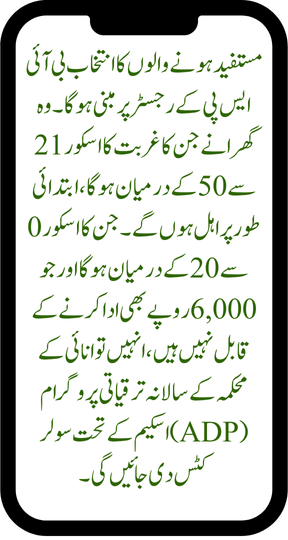In a groundbreaking move to combat energy poverty and promote sustainable living, the Sindh government has announced the distribution of 200,000 Solar Home Systems (SHS) to low-income households across the province. This initiative aims to provide affordable and reliable solar energy solutions to families identified through the Benazir Income Support Program (BISP), significantly enhancing their quality of life.
Project Overview
Key Announcements
- Initiative Launch: The Sindh government plans to distribute 200,000 SHS kits to low-income families.
- Target Beneficiaries: Households identified through BISP data in all 30 districts of Sindh.
- Funding: The Sindh Solar Energy Project (SSEP) is being executed with a budget of Rs27.4 billion, supported by a $100 million financial contribution from the World Bank.
- First Batch: The initial batch of 50,000 SHS kits is expected to arrive in Karachi by the end of October.
Components of the Solar Home Systems
Each SHS kit comprises:
- Solar PV Plate: 80-100 W capacity.
- Battery: Minimum 18 AH Lithium-ion battery.
- Accessories: One DC fan, three LED bulbs, and a mobile charging facility.
Also Read: Punjab Government Launches Free Solar Panel Distribution Scheme (One Lakh Soler)
Cost and Subsidy
- Estimated Cost: Each SHS kit is valued at approximately Rs.55,000, covering transport, taxes, and duties.
- Subsidy: Eligible low-income families will receive the kits at an 80% subsidy, paying only Rs.6,000.
Selection Criteria
The selection of beneficiaries is based on the BISP register. Households with a poverty score ranging from 21 to 50 are initially eligible. Those with scores between 0-20, unable to afford even Rs.6,000, will receive the kits under the Annual Development Program (ADP) scheme of the Energy Department.

Program Strategy: Old vs. New
Originally launched in 2020 with a 40% subsidy, the program faced challenges, distributing only 322 systems. The revised strategy, implemented in 2023, increased the subsidy to 80% and adopted a Bulk Procurement Model to streamline distribution.
Distribution Strategy
Framework agreements have been signed with three private companies selected through a competitive process:
- M/S Bboxx Ltd, UK
- M/S Shenzen LEMI Technology Development Co. Ltd, China
- M/S D.light Design Ltd, USA
Five NGOs under the Sindh Peoples Housing Foundation Project (SPHF) will handle the collection, distribution, installation, and replacement of the SHS kits. Beneficiaries will pay Rs.6,000 via a Bank Challan receipt from Sindh Bank Limited.
Transparency and Monitoring
To ensure transparency and compliance, a database management system has been developed. Independent Verification Agents (IVAs) will conduct random checks and follow up on reported issues. A dedicated helpline number (021-111-222-262) has been set up for registering complaints.
Detailed Table of Key Data
| Aspect | Details |
|---|---|
| Total SHS Kits | 200,000 |
| First Batch Arrival | October |
| Cost per SHS Kit | Rs.55,000 (including transport, taxes, and duties) |
| Subsidy Percentage | 80% |
| Beneficiary Payment | Rs.6,000 |
| Key Components of SHS | 80-100 W Solar PV Plate, 18 AH Lithium-ion battery, 1 DC fan, 3 LED bulbs, mobile charging |
| Initial Launch Year | 2020 |
| Revised Strategy Year | 2023 |
| Number of Districts Covered | 30 (including 7 districts of Karachi) |
| Selected Companies | M/S Bboxx Ltd, M/S Shenzen LEMI Technology Development Co. Ltd, M/S D.light Design Ltd |
| NGOs Involved | 5 NGOs under SPHF |
| Helpline Number | 021-111-222-262 |
Conclusion
The distribution of 200,000 Solar Home Systems to low-income families in Sindh represents a transformative step towards sustainable energy and poverty alleviation. By leveraging BISP data, providing substantial subsidies, and ensuring transparency through independent verification, the Sindh government aims to illuminate the lives of the province’s most vulnerable households. This initiative not only addresses energy poverty but also contributes to the broader goal of sustainable development in Pakistan.










